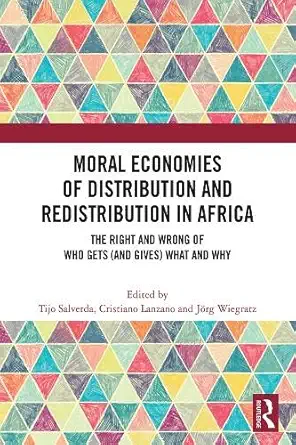
Moral Economies of Distribution and Redistribution in Africa: The Right and Wrong of Who Gets (and Gives) What and Why
Author(s): Tijo Salverda (Editor), Cristiano Lanzano (Editor), Jörg Wiegratz (Editor)
- Publisher: Routledge
- Publication Date: November 3, 2025
- Edition: 1st
- Language: English
- Print length: 190 pages
- ISBN-10: 104112905X
- ISBN-13: 9781041129059
Book Description
This book examines how moralities of distribution and redistribution operate and intertwine in everyday African economic life, enhancing current understandings of capitalism on the continent. Through rich ethnographic studies spanning eight countries―Ghana, Nigeria, Burkina Faso, Equatorial Guinea, Ethiopia, Uganda, Kenya, and Zimbabwe―the volume reveals how these moral perspectives of right and wrong connect macro political economies with micro-level social norms and expectations.
As debates about economic inequality intensify globally, this timely work illuminates how African actors navigate complex (re)distributional dynamics, duties, and pressures in contemporary capitalist contexts. The contributors provide nuanced analyses of socioeconomic inequalities that often remain obscured in scholarly and public discourse, making a significant contribution to the growing field of moral economy research in Africa and beyond.
This book is essential reading for scholars of African studies, economic anthropology, political economy, development studies and anyone interested in understanding how moral frameworks shape economic relations, practices and outcomes across diverse African settings.
The chapters in this book were originally published in Journal of Contemporary African Studies.
Editorial Reviews
Review
This volume offers a timely and theoretically grounded intervention into longstanding debates about the moral underpinnings of capitalism in Africa. Drawing on richly detailed case studies from across the continent, the contributors examine how practices of distribution and redistribution are morally evaluated, justified, and contested at multiple scales, from kinship networks and street markets to elite politics and religious institutions. The volume will be of particular interest to readers seeking a nuanced understanding of how moral grammars shape everyday forms of (re)distribution and economic life in contemporary Africa.
Professor Catherine Dolan, Professor of Anthropology, Department of Anthropology and Sociology, SOAS, UK
About the Author
Tijo Salverda is an economic anthropologist, who has held several research positions and (temporary and guest) professorships at institutions including the University of Vienna, the University of Pretoria, and the University of Cologne. Tijo has published widely on elites, inequality, moral economy, and corporations and their critics – in Mauritius, Zambia, South Africa, and various European countries. He is also involved in applied- anthropological projects, with a particular focus on the just transition and the distribution of the costs and benefits of climate change.
Cristiano Lanzano is a social anthropologist, currently affiliated with KULeuven (Belgium) and IFSRA (Burkina Faso). He has worked for more than fifteen years as a researcher and lecturer for different universities and institutes across Europe, such as the universities of Torino (Italy) and Uppsala (Sweden), and the Nordic Africa Institute (Sweden). He has conducted research in several West African countries, investigating on topics such as urban culture and youth, informal economies, labour mobilities, natural resources management, and the mineral sector.
Jörg Wiegratz is Associate Professor of Global Political Economy and Development at the University of Leeds, School of Politics and International Studies. He is also Senior Research Associate, Department of Sociology, University of Johannesburg. He specialises in neoliberalism, fraud and anti- fraud measures, commercialisation and economic pressure and related aspects of moral and political economy, with a focus on Uganda and Kenya. He is co- editor of Neoliberalism and the Moral Economy of Fraud (2016, with David Whyte).
 Wow! eBook
Wow! eBook

